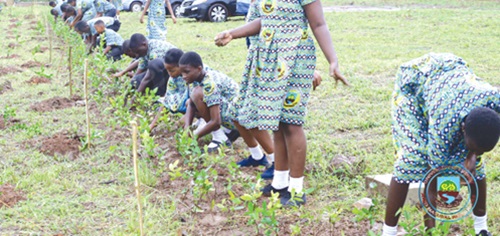As the world marks World Environment Day 2025 on the theme, “Plastic Waste Reduction: Restoring Our Planet’s Balance”, the Presbyterian Church of Ghana (PCG) stands as a beacon of hope and action in the fight against environmental degradation.
Since the launch of its Ecological Integrity Campaign in 2019, the church has actively demonstrated what it means to be a responsible steward of God’s creation.
Over the past six years, the PCG has implemented impactful initiatives across the country.
From nationwide tree planting exercises to plastic recycling projects, the church has mobilised congregants, schools, and communities to take action.
Notably, children in Presbyterian basic schools and children's ministries have championed up-cycling workshops, transforming waste materials into creative, functional items.
These workshops not only foster environmental consciousness but also equip young minds with practical skills and eco-responsibility.
The church has also held symposia and training sessions on environmental sanitation, hygiene, and the theology of creation care.
These platforms have engaged thousands of Presbyterians, creating a strong faith-based foundation for ecological advocacy.
With over a million members across Ghana, the PCG continues to use its national reach to inspire behavioural change and sustainable practices.
Environmental mission
Central to the church’s environmental mission is its theological grounding.
The Bible reminds us in Genesis 2:15: “The Lord God took the man and put him in the Garden of Eden to work it and take care of it.”
This verse anchors the church’s belief that human beings are caretakers of the Earth, not exploiters.
As stewards of God’s creation, Christians have a divine responsibility to protect and preserve the environment for future generations.
This year’s World Environment Day theme is especially relevant to Ghana, where plastic pollution poses a growing threat to public health, agriculture, and aquatic life.
From clogged drains in Accra to plastic-choked beaches in coastal communities, the nation faces a crisis that calls for urgent action.
Ghana generates tonnes of plastic waste annually, yet only a fraction is recycled, leading to indiscriminate dumping and environmental harm.
The PCG has established community recycling hubs at local congregations, encouraging the sorting and proper disposal of plastics.
Our plastic recycling centre, located in Sunyani in the Bono Region, supports this initiative.
Churches and other religious organisations can play pivotal roles in combating this menace.
The church can ban single-use plastics at all its events, churches, and institutions.
By modelling plastic-free gatherings, the church sets an example for its members and the wider public.
Also, it can incorporate environmental education modules into Sunday School, Bible study, and preaching, to help members connect their faith with environmental action.
Globally, churches can create or join interfaith coalitions advocating for climate justice, pushing for international collaboration to reduce plastic production and pollution.
The need to actively care for the environment goes beyond the church and into society at large.
There is a need for all Ghanaians to embrace biodegradable alternatives, support local innovators working on sustainable packaging, and put pressure on policymakers to enforce environmental laws.
In conclusion, World Environment Day 2025 is more than a date on the calendar—it is a call to action.
Let us rise as guardians of the Earth, guided by faith and conviction.
The Presbyterian Church of Ghana invites all Presbyterians, all Ghanaians, and all people of goodwill to become advocates for creation care.
The Earth is the Lord’s—and we are its stewards.
Let us act now with passion and purpose to preserve it for generations to come.
The writer is the National Director
Development and Social Services
Presbyterian Church of Ghana
presbydss@gmail.com
teikosabah@gmail.com

